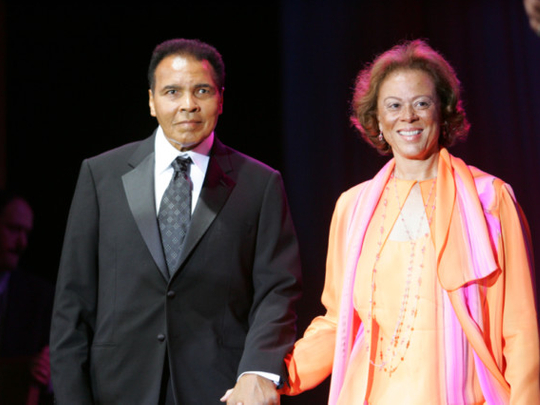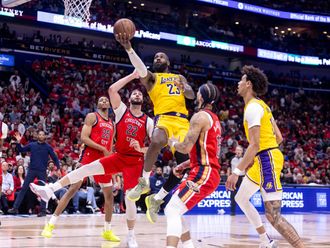
Abu Dhabi: On October 30, 1974, Muhammad Ali met George Foreman in a world heavyweight boxing title fight in Kinshasa, Zaire (now the Democratic Republic of Congo), which has been immortalised as ‘The Rumble in the Jungle.’
It was a landmark bout which the American writer, Jay Kang, and countless other pundits consider to be the greatest sporting spectacle of the 20th century.
Ali, 32, reclaimed the world heavyweight title he had first won in 1964 with a spectacular knockout victory over the previously unbeaten 25-year-old George Foreman — a human wrecking ball with dynamite in his fists.
Forty years on, and the indomitable warrior Ali continues to defy the odds by battling his greatest ever opponent, Parkinson’s Syndrome, which he was diagnosed with in 1984 and which is thought to have been caused by his arduous 21-year boxing career.
The degenerative brain disease has left the 72-year-old a shadow of his former vibrant self — a man who was the architect of balletic brilliance in the boxing ring and grandiose words and deeds out of it.
Yet, as his wife Lonnie told Gulf News in an exclusive interview, Ali simply refuses to let Parkinson’s beat him — in the same heroic and stoic vein as he would not yield to the younger and more powerful Foreman 40 years ago.
Vigorously refuting recent media reports — particularly in the British tabloid press — that her husband is in a grave condition, Mrs Ali said via email: “Muhammad is well, in spite of reports in the UK tabloid media. It’s unfortunate that such stories are published without any regard for the truth. I’d like to put people’s minds at ease because when these unfounded reports appear in the press, I receive calls from people all over the world who love and care about Muhammad.
“People must understand that Muhammad has had Parkinson’s Disease for over 30 years. He is in very fine health for someone who has had the disease for that length of time. I say this with complete confidence. His recent annual physical indicated he’s in great health.”
“I would suggest media organisations who are so disturbed by the effects of Parkinson’s Disease on Muhammad, make substantial monetary donations in support of Parkinson’s research,” she added. “I’m sure everyone with Parkinson’s Disease, including Muhammad, would be appreciative.”
Her husband may still be mortal, but Ali’s legacy will never die — the three world heavyweight title wins, his anti-war stance and his myriad of unforgettable and inspirational soundbites (“I’m so fast that last night I turned off the light switch in my hotel room and got into bed before the room was dark”, for instance).
But why was ‘The Rumble in the Jungle’, in which he knocked Foreman out in the eighth round, one of his most seminal triumphs?
Mrs Ali, who first became friends with her husband in 1964 in his hometown of Louisville, Kentucky, said: “The Rumble in the Jungle was significant to the world because it gave people the inspiration to defy the odds, to overcome adversity and believe in themselves. They came to realise that overcoming the odds to attain their own personal victories was not a far-fetched reality, that impossible really is possible and if Muhammad could do it, so could they.
“For Muhammad or anyone to win the heavyweight championship of the world three times was highly improbable. Before the fight in Zaire, Muhammad had fans and supporters all over the globe.”
Mrs Ali recalled how her husband had first earned global renown — and made the impossible possible — by winning the world heavyweight title for the first time in 1964 at the age of 22, when he overcame the experienced and heavily fancied Sonny Liston.
“Sonny was a very formidable and experienced opponent,” she said. “Muhammad’s stunning defeat of Sonny captured the imagination of the world. It was the story of David and Goliath all over again.
“In that unlikely moment, America and the world became aware of Cassius Clay, the soon to be Muhammad Ali. With his undeniable wit, charm and masterful ability to self-promote, the global community watched him grow up and they bought in.
“But aside from being the brash and confident pugilist, Muhammad was sweet and nice, handsome and beautiful. He was like the boy next door. His fights became anticipated events with a global audience. So, it was not surprising that everyone who had a television or radio or access to either, was anxiously awaiting the start of this fight.”
Aside from his prodigious boxing skills, Ali transcended his sport by converting to Islam and staying resolutely true to his trenchant peacekeeping beliefs at the expense of his own career.
He refused to go to the Vietnam War in 1967 with the U.S Military — and was subsequently stripped of his world heavyweight title by the New York State Athletic Commission, which also suspended his boxing licence, and did not fight again until 1970.
Ali was convicted of draft evasion, sentenced to the maximum of five years in prison and fined $10,000, although he remained free while the conviction was appealed.
In 1970, the New York State Supreme Court ordered that his boxing licence should be reinstated, and he returned to the ring by knocking out Jerry Quarry in October 1970.
The following year, the U.S. Supreme Court overturned Ali’s conviction in a unanimous decision.
“Although his beliefs and actions had cost him the support of many Americans, they also gained him many more, mostly outside of America,” Mrs Ali, the boxing legend’s fourth wife — they married in 1986 — said.
“At the time of the [Rumble in the Jungle] bout, Muhammad was considered past his prime. Add to that, the bout could only be won by defeating another one of boxing’s most formidable boxers, George Foreman, someone who had destroyed his previous opponents.”
“Physically, George was massive and intimidating — although he was, and remains physically intimidating, George is a very kind and generous man,” she continued. “He was a much larger man than Muhammad and it was all muscle and brawn. His fists look like sledgehammers. Many felt if Muhammad emerged from the ring in one piece, it would be a victory. If Muhammad won, it would be him beating the odds in a big way.”
Mrs Ali said it was the ingenious manner in which her husband overcame Foreman (he did not succumb to the bigger man’s most vicious blows and employed ‘rope-a-dope’ tactics, whereby he took breathers on the ropes to sap his opponent’s energy) which means the fight remains indelibly etched in the minds of boxing fans.
She said: “It was his boxing skills, athleticism, physical stamina, wit, cunning and sheer determination to win [which stood out].
“During the course of the pre-fight preparation and hype, Muhammad being Muhammad, united the people of Zaire behind him. If he won — they won. It was their victory too. Muhammad was their brother, son and uncle.
“So once again, Muhammad did what others thought unimaginable, impossible. He defied the odds.”
Some things never change.












